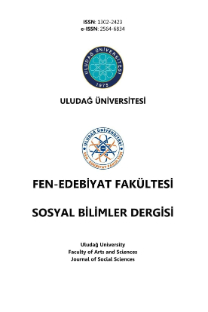ASYLUM SEEKERS and REFUGEES in BULGARIA:BETWEEN OPENED and CLOSED DOORS
Bulgaristan'da Sığınmacılar ve Mülteciler: Açılıp Kapanan Kapılar Arasında
___
- Bulgarian Patriarchy. Izvanredno obrashtenie na Sv. Sinod na BPTS po povod krizata s bezhantsite. 26 November 2016, Available at: http://www.bg-patriarshia.bg/news.php?id=184530, (25 March, 2017).
- Collyer, M. and H. De Haas (2012). Developing Dynamic Categorization of Transit Migration. Population, Space and Place, 18 (4), pp. 468-484.
- Council Regulation (EC) No 343/2003 of 18 February 2003, Official Journal L 050, 25/02/2003, Available at: http://eurlex.europa.eu/LexUriServ/LexUriServ.do?uri=CELEX:32003R0343:E N:HTML, (Accessed 15 November, 2015)
- Danova, N. et al. (1995). Predstavata za 'Drugia'na Balkanite. [The Image of 'the Other' in the Balkans.] Sofia: Akademichno Izdatelstvo. Darzhaven vestnik [State Gazette] No 80 from 16 October, 2015; No 40 from 16 May, 2000; No 84 from 14 October, 1994.
- Dnevnik "Chirpanliev: V Bulgaria ot bezhantsite ostavat samo kyurdite, koito sa po-zle i ot nashite tsigani" (In Bulgarian) 23.11.2014. Available at: http://www.dnevnik.bg/bulgaria/2014/11/23/2424715_chirpanliev_v_bu lgariia_ot_bejancite_ostavat_samo/, (Accessed 15 November, 2015)
- Falzon, M.-A. (ed.) (2009). Multi-Sited Ethnography. Theory, Praxis and Locality in Contemporary Research. Farnham: Ashgate. Gaddis, J. (2005). The Cold War: A New History. New York: The Penguin Press.
- Gencheva, R. (2012) Avtoethnographiya na prehoda: ponyatiyata bezhanets i ubezhishte v Bulgaria sled 1989. [Autoethnography in transition: the concepts of refugee and asylum in Bulgaria since 1989] Sociologicheski problemi, 1-2, 9-25.
- Gergova, L. (2012). Ethnicheski stereotipi vav vsekidnevnata kultura. [Ethnic Stereotypes in the Everyday Culture] Sofia: Paradigma. Haydinyak, M. (ed.) (2011). Migratsii, pol, mezhdukulturni vzaimodeystviya v Bulgaria. [Migration, Gender and Intercultural Interactions in Bulgaria] Sofia: IMIR.
- Içduygu, A. and D. Sert. (2007). Migrants'Uncertainities versus the State's Insecurities. Transit Migration in Turkey. In: M. Collyer et al (eds.) Transit Migration in Europe. The Netherlands: Amsterdam University Press, pp.37-54.
- Krasteva, A. (ed.) (2005). Imigratsiyata v Bulgaria. [Imigration in Bulgaria] Sofia: IMIR.
- Krasteva, A. (ed.) (2006). Figurite na bezhanetsa. [The Refugee Figures] Sofia: Nov Bulgarski Universitet.
- Krasteva, A. et al. (eds) (2010). Migrations from and to Southeastern Europe. Ravenna: Longo Editore.
- Lazarova, G. (2004). Bulgarskiyat ethnicheski model v mediynoto ogledalo: dvulikiyat Yanus. [Bulgarian Ethnic Model in the Media Mirror: Janus-headed] In: A. Krasteva (ed.) Ot ethnichnost kam migratsiya. Sofia: Nov Bulgarski Universitet, pp. 60-74.
- Mancheva, M. and E. Troeva. (2011). Migratsii ot i kam Bulgaria: sastoyanie na izsledvaniyata. [Migrations from and towards Bulgaria: conditions of the studies] In: M. Haydnyak (ed.). Migratsii, pol, mezhdukulturni vzaimodeystviya v Bulgaria. Sofia: IMIR, 17-68.
- Mancheva, M. and E. Troeva. (2011). Migratsiya, religiya i dzhendar: imigrantki myusyulmanki. [Migration, Religion and Gender: Muslim Imigrant Women] In: M. Haydnyak (ed.). Migratsii, pol, mezhdukulturni vzaimodeystviya v Bulgaria. Sofia: IMIR, 177-216.
- Marcus, G. (1995). Ethnography in/of the World System: The Emergence of Multi-Sited Ethnography. Annual Review of Anthropology, 24, 95-117.
- Montanari, A. and G. Piazzese. Smuggling migrants through Bulgaria. 23.08.16. Deutsche Welle, Available from: http://www.dw.com/en/smuggling-migrants-through-bulgaria/a- 19491758, (20 January, 2017)
- OXFAM International. Refugees crossing into Europe tell of abuse at hands of Bulgarian Police. 13 November 2015, Available at: https://www.oxfam.org/en/pressroom/pressreleases/2015-11- 13/refugees-crossing-europe-tell-abuse-hands-bulgarian-police, (Accessed 20 November, 2015)
- Regulation (EU) No 604/2013 of the European Parliament and of the Council of 26 June 2013, Official Journal of the European Union L180/31, Available at: http://eur-lex.europa.eu/legalcontent/EN/ALL/?uri=CELEX:32013R0604, (Accessed 15 November, 2015)
- Report of the Vice Prime Minister and Minister of Interior (In Bulgarian) 20.11.2013. Available at: http://www.24chasa.bg/Article.asp?ArticleId=2463407, (Accessed 20 September, 2014)
- Said, Ed. (1978). Orientalism. New York: Random House. State Agency for Refugees. Applications and decisions taken 01.01.1993-28.02.2017. Avalaible at: http://www.aref.government.bg/?cat=21, (Accessed 15 March, 2017)
- State Agency for Refugees. Prava i zadylzheniya na chuzhdentsite poluchili zakrila spored zakona za ubezhishteto i bezhantsite. (in Bulgarian), Avalable at: www.aref.government.bg/docs/PRAVA.doc, (Accessed 15 November, 2015)
- Trud Online. "Elena Yoncheva: Trybva da sprem da iznasyame demokratsiya s bombi" (In Bulgarian). An interview with Elena Yoncheva. 22.11.2015. Available
- UN High Commissioner for Refugees (UNHCR), UNHCR observations on the current asylum system in Bulgaria, 2 January 2014, Available at: http://www.refworld.org/docid/52c598354.html (Accessed 11 April 2017)
- United Nations Treaty Collection. Convention relating to the Status of Refugees, Geneva 28 July 1951; Protocol relating to the Status of Refugees, New York, 31 Jaunary 1967; Available at: https://treaties.un.org/Pages/Treaties.aspx?id=5&subid=A&lang=en, (Accessed 15 November, 2015)
- ISSN: 1302-2423
- Yayın Aralığı: 2
- Başlangıç: 1999
- Yayıncı: Bursa Uludağ Üniversitesi
I. CONSTANTINUS'UN HRİSTİYANLIĞI MESELESİ ve ÖLÜMÜ HAKKINDAKİ TARTIŞMALAR
PATIENTS and HEALERS in "ZAABALAWI" by NAGUIB MAHFOUZ and A STRANGENESS IN MY MIND by ORHAN PAMUK
BEETHOVEN'IN SON DÖNEM ÜSLUBU, SON PİYANO SONATLARI ve "OP. 106, HAMMERKLAVİER"
I. CONSTANTINUS'UN HRİSTİYANLIĞI MESELESİ ve ÖLÜMÜ HAKKINDAKİ TARTIŞMALAR
PROGRAMLI MÜZİK: İZLENİMCİ MÜZİKTE DOĞA BETİMLEMELERİ ve C. DEBUSSY'NİN 'SU' TEMALI PİYANO PARÇALARI
ABDULLAH NÂZİK'İN BURSA ŞEHRENGİZLERİ
ASYLUM SEEKERS and REFUGEES in BULGARIA:BETWEEN OPENED and CLOSED DOORS
